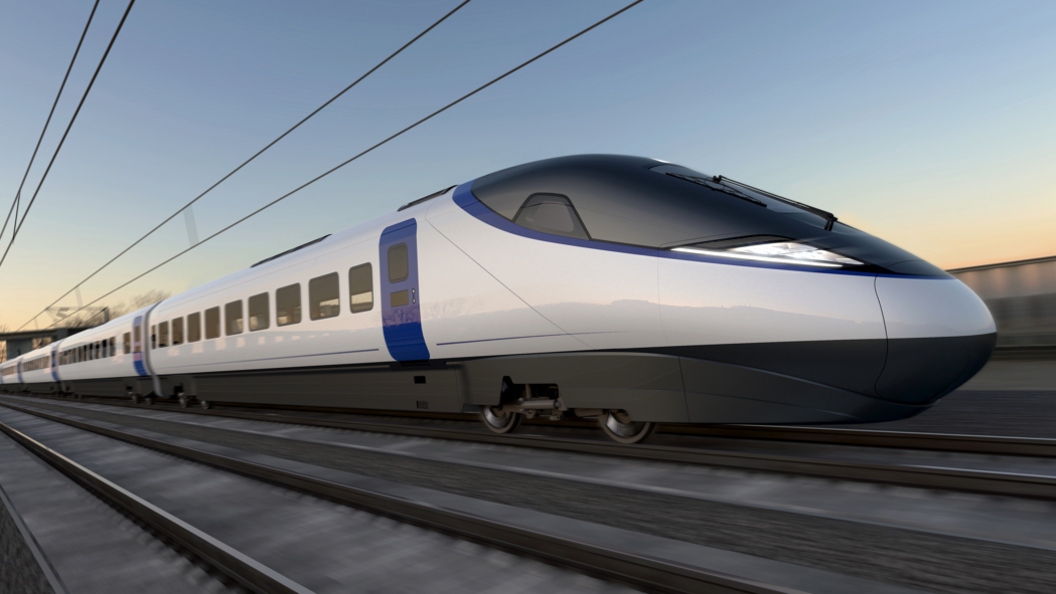Fewer HS2 seats could force passengers not to travel

- Published
The government may need to deliberately put people off travelling to Manchester by rail because scrapping HS2’s northern leg is likely to mean trains can take fewer passengers.
New HS2 trains will travel north of Birmingham on existing tracks but they will have less space than current services, according to a report by the public spending watchdog.
The National Audit Office (NAO) said the government could need to manage demand by “incentivising people to travel at different times or to not travel by rail”.
The NAO's report also stated that the previous Conservative government had spent £592m buying up land and property along now-cancelled parts of the route.
Last October, then-Prime Minister Rishi Sunak announced that sections of the high-speed railway linking Birmingham with Manchester and with the East Midlands would no longer be built.
It means that only the stretch between London and the West Midlands will go ahead. New trains built for HS2, however, will run over the entire line.
But the NAO said these trains “may have fewer seats than existing services”, and HS2’s delivery company estimates that capacity between Manchester and Birmingham could be reduced by 17%.
The Department for Transport (DfT) is looking at how longer HS2 trains could be used, but existing stations such as Crewe would have to be adapted.
As a result, the NAO said that the DfT “will need to assess options for addressing capacity issues on the west coast”, such as dissuading passengers from travelling by train at certain times - if at all.
But the report warned that this may constrain economic growth and increase environmental costs.
Another option would be “improving or adding infrastructure”, but this could be expensive and disruptive.
"It’s long been clear that the Conservatives recklessly mismanaged HS2 and allowed the costs to spiral entirely out of control – but this report lays bare the scale of their mistakes," Labour's new Transport Secretary Louise Haigh said.
A spokesperson for the Conservatives said: “As the NAO report makes clear, when we left office there were a number of options under consideration to maximise the benefit of HS2. The new government will decide which of those options to take forward."
HS2 offers 'very poor value for money', MPs warn
- Published7 February 2024
Rage and relief over scrapped HS2 northern leg
- Published5 October 2023
HS2 West Midlands-Manchester line to be scrapped
- Published4 October 2023
Watch on iPlayer
HS2: End Of The Line?
- Attribution
The NAO report also said that disposing of the land and property bought along the northern leg of the route could take several years, although some may be needed for other transport projects such as Northern Powerhouse Rail.
The recent King's Speech included a High Speed Rail Bill, which had previously been tabled to build HS2's northern leg.
The new government said it would not revive HS2's cancelled sections but repurpose the bill to bring in powers to build new rail infrastructure in northern England.
"We are reviewing this report’s findings, alongside the position we have inherited on HS2 and wider transport infrastructure and will set out next steps in due course," Ms Haigh said.
“Transport is an essential part of our mission to rebuild Britain – and we're committed to delivering infrastructure that works for the whole country."
Last October, when the northern leg was scrapped, the then-government said that a terminus at Euston would go ahead but only with private funding.
If HS2 did not reach Euston, passengers would have to change at Old Oak Common in west London to reach the capital’s centre.
The authors of the NAO report said there would be more costs to come on top of the cancellation, which is expected to take three years and cost £100m.
Some work will be done even though it is no longer required.
For example, only three platforms will now be needed at Birmingham Curzon Street, but the full seven will be built because it would cost more to cancel.
Since 2020, construction costs have increased by £6.1bn.
The NAO report says the DfT and HS2 Ltd are finalising a "lowest cost action plan" to try to reduce costs, particularly through trying to renegotiate contracts.
A spokesperson for HS2 Ltd said: “This is a project of unprecedented scale and complexity and the cancellation of Phase 2 has increased our cost challenges."
Reasons include the budget and schedule being set too early, delays to planning consent and the impact of external events such as the Covid-19 pandemic.